- Home
- Chris Ryan
Ruthless Page 3
Ruthless Read online
Page 3
‘You’re nailing it, mate,’ Max said. ‘Come on, let’s get downstairs.’
The others, with the exception of Hector, were waiting in the hotel foyer. They were all dressed in nondescript clothes which, although they weren’t a million miles from the clothes they would normally wear, somehow made them look substantially different. Each of them carried a blue head-wrap similar to Max and Sami’s. Other than the concierge, they were the only people about.
‘Where’s Hector?’ Max asked quietly. Angel nodded at the revolving doors at the front of the hotel. A white van, dented along one wing, was pulling up outside. The cadets followed Woody and Angel out of the hotel and into the back of the van. There was seating along both sides, and no windows. There were five rucksacks waiting for them. The only light came from a dim bulb. The cadets took their places facing each other and the van moved off.
‘Take a rucksack each,’ Woody said. ‘You’ll find some basic supplies in there. Medical packs, water, paracord, cable ties, a knife, and an extra surprise I’ll show you when we reach our destination. Hector’s going to drop us on the edge of the Alemão favela. We expect to be there at 0530 hours. There will be people around, but they’ll mostly be workers making their way into central Rio. The gang members and street kids tend to be busy at night, so they sleep late. Activity starts again around mid-afternoon. Our drop-off point is a safe house. It’s owned by a Brazilian family who are paid by the British Embassy to deliver information about gang and police movements to British Intelligence.’
‘How do we know we can trust them?’ Lukas said. The cadets had, in the past, learned the hard way that in their line of work, trusting the wrong person could have serious consequences.
‘You really want to know?’
‘Of course.’
‘They’ve taken money for information on Blue Command and the BOPE. Having done that once, they know they’re vulnerable. British Intelligence can find ways of informing the gang what the family have done. If that happened, they’d have hours to get out of the favela, if that.’
‘We’re blackmailing them?’ Sami asked, clearly aghast.
‘If that’s the word you want to use,’ Angel said.
‘What word would you use?’ Lili said.
‘It’s just the way the world is, okay?’ Angel said. ‘Get used to it. In any case, my understanding is that the family are on board. Nobody needs to blackmail anybody.’
There was an uncomfortable silence before Woody started talking again. ‘We’ll set up an ops centre in the safe house. Angel and I will be there at all times. We’ll be monitoring your position via the GPS chips in your phones. Each phone has an encrypted calling app. If there’s an emergency, launch the app, dial 111 and we’ll mount a rescue mission. But that must be a last resort. Your mission is to locate the ambassador’s son and extract him to a school – Escola Rodrigues Leandro in the north-west corner of the favela. We’ll brief you on its exact location when we reach the safe house. Once you’re on the school roof, you’ll contact Hector by dialling 222. He’ll scramble a helicopter to pick you all up from the roof.’
‘Wouldn’t it be better,’ Lili said, ‘to have the helicopter pick us up closer to Tommy’s location?’
Woody shook his head. ‘Blue Command are heavily armed. There was an incident a while back when they shot down a helicopter flying over their turf. We can’t risk that happening. The ambassador’s son is bound to be deep in Blue Command territory. You have to get him somewhere safer.’
‘You all have head-wraps,’ Angel said. ‘It’s kind of a fashion thing in the favela. If you want to disguise yourself as regular citizens, use those. But you might also want these.’ She handed out blue bandanas. ‘Only Blue Command personnel wear these,’ she said. ‘Either covering their hair or the lower half of their face. Put them on now.’
Silently, the cadets wrapped the bandanas around their faces. Max’s breath felt hot under the material. He examined the others. Having their faces obscured made them look threatening, but they all had a hint of wariness in their eyes as they glanced at each other. Max had come to know them well, and he could sense that they were as anxious as him.
The van slowed down. Max felt his anxiety bite. The vehicle came to a halt. Woody and Angel opened the back of the van and daylight streamed in, stabbing Max’s eyes. Dawn had broken. ‘Come on,’ Angel said. ‘Quickly.’
The cadets followed the Watchers out of the van. They found themselves in a deserted street on a steep hill. There were concrete buildings on either side. Some were painted in shades of white and orange that had grown dirty with age. Others were bare concrete. Most of the buildings were plastered with spray-painted graffiti: Portuguese slogans that Max was unable to translate but which Lili seemed to be reading intently. One particular slogan seemed to demand her attention.
‘What does it say?’ Max asked.
‘It says, “The police will die”,’ Lili said.
The van had stopped outside a bar called the Cafe Tricolor. It didn’t look very welcoming. Like many of the other buildings along the road, the cafe’s frontage was obscured by heavily padlocked metal shutters, which were also covered in spray paint. Overhead there was a tangled network of cables. Max assumed they were power lines, as they led to each of the houses in turn. But they did not look as if they had been installed professionally. Some of the lines sagged badly, others had exposed wire at ramshackle junction boxes and some seemed to be entering buildings through open windows.
Max could hear a male voice shouting somewhere, but he couldn’t see its owner. There were no people in the street at this early hour, but there were a couple of parked cars in view. An old white VW campervan was parked against one of the bare concrete buildings, its front right tyre flat. Beyond it was a red saloon car, beaten up, with an empty roof rack.
On the other side of the road, opposite the Cafe Tricolor, was an alleyway. Woody and Angel headed straight for it and the cadets followed. As Max reached the entrance to the alleyway, he noticed something on the front wall of the adjacent orange building. It was a hole, big enough to fit his fist into. Sami, who was behind him, said, ‘It’s a bullet hole. They were everywhere in Syria when I was growing up. There were many people with guns, but they weren’t skilled. Stray bullets hit buildings all the time. It will be the same here, I think. We’ll have to be careful.’
Max nodded his agreement, then followed the others down the alleyway. It led to the back of the orange building. Here there was a rough courtyard with high breezeblock walls and an external metal staircase spiralling up to the first floor of the building. Two feral cats sat on the staircase. They scampered away as soon as the cadets appeared. Angel climbed the staircase and rapped quietly on the door at the top. It opened almost immediately and she gestured at the others to follow. They clattered up the staircase and filed inside.
They found themselves in a room that covered the entire floor of the building. There was an open staircase against one wall leading to the floor above. Max assumed that the sleeping quarters of the family who lived here must be up there, because this was a communal living area. A couple of patched sofas sat in the middle of the room, and an old electric oven against the right-hand wall. In pride of place was a TV. It was not a flat-screen, but an old-fashioned boxy one on a wooden unit. A power cable and an aerial snaked to it from the open window. The TV was on, but all it showed was snowy interference. A small boy stood in front of it, pointing a remote control at the screen. His head was silhouetted by the glow and he was shaking the remote, as if perplexed by the lack of a picture.
The little boy was not the only person in the room. There were four others: two parents and two teenagers, a boy and a girl, who looked like twins. The parents had friendly faces, but they were lined with worry. The mother ushered the guests into the room – ‘Quickly, quickly!’ – then shut the door behind them. The two teenagers lurked awkwardly by the open staircase, and the boy didn’t take his eyes from the TV screen. He tried to change the
channel with no success.
The father was a stocky man wearing knee-length shorts and a grubby string vest. He shook everybody’s hands in turn. ‘Welcome, welcome,’ he said. ‘Our house is yours. Unwrap your scarves but please, do not leave and do not make a noise. If the BOPE find out that you are here, or the gangs …’ He shook his head as if to indicate that this would be a terrible outcome. ‘I am Manuel, and this is my wife Marta. These are our twins, Leonardo and Verissimo. And this is Pepe.’ He turned to the boy and said something sharply in Portuguese. The boy turned. He had a chubby, adorable face. Looking crestfallen, he replied to his father in Portuguese and then, with obvious reluctance, switched off the TV.
‘He’s football crazy!’ said Manuel. ‘If he can’t play, he watches. If he can’t watch, he plays!’ He pointed at Max’s Brazil football shirt. ‘One day,’ he announced, ‘he will be the new Pele! My boy, he can put a ball in the corner of the net from the halfway line!’
Max looked over at the boy, unable to help replaying Hector’s voice in his head. It’s a tough life, being a gang member in Blue Command. Kids are recruited early. At the age of eight – younger, sometimes. And their life expectancy is short. Gun crime, drugs … Once you’re in the gang, your chances of making it past the age of twenty are slim.
He thought of the bullet hole in the front wall of the building. If the bullet that made it could do that to concrete, what would it do to a little boy? Max wondered if Pepe would make it to professional footballing age.
He turned to Angel and Woody. ‘What do we do now?’ he said.
‘We set up,’ said Angel. ‘And we wait.’
5
Pepe’s Plan
Woody and Angel each had a shoulder bag, from which they removed a laptop in a hard, scuffed case and a satellite phone. They set these up on a table near the window, propping the sat phone on the sill so it had line of sight to the sky. They logged into their system, then handed each of the cadets a phone on which individual facial recognition software had been set up.
‘Secure and encrypted,’ Angel told them. ‘Keep them on you. That’s how we’ll track your position.’
‘There’s an app on the home page of each phone,’ Woody continued, ‘next to the encrypted calling app. It’s called Fogo Cruzado. It means Crossfire. It’s designed to pinpoint the location of any gunfire in the Rio de Janeiro area in real time. The locals use it so they know which areas to avoid.’
‘Sounds more exciting than Candy Crush,’ Abby said.
‘Saves more lives than Candy Crush too. Keep an eye on it.’
The Watchers spread a satellite image of the favela out on the table. Using a red marker, Woody circled their current position in the south, then drew a circle to the north-east with a diameter of about 500 metres. ‘This area is Blue Command’s turf,’ he said. ‘You’ll see that there are only a handful of streets that head into this area.’ He indicated five different entry points. ‘You’ll need to access their territory using one of these.’
‘But you must be careful,’ Manuel said. He was loitering behind the cadets, holding Pepe’s hand. ‘Those entrances are often blocked. Armed men. They do not let anyone in without checking them first.’
‘We’ll need a distraction,’ Lukas said.
‘Right,’ Woody agreed. ‘Max, give me your rucksack.’ He reached into Max’s bag and pulled out what looked like a spray can. ‘We can’t give you live ammunition, but we can give you these. Do you know what they are?’
‘Flashbangs,’ Max said immediately.
‘Exactly. They’re grenades that make an enormous noise and a blinding flash of light. Harmless otherwise. There’s one each. Use them carefully to distract your enemy. When you’re within the Blue Command cordon, you’ll have to work out a way to locate the target. Once you’ve done that, you need to extract him to this location here.’ He drew another circle around a large building in the north-east of the favela. ‘You need to study this map carefully. Commit it to memory.’
Max had already started to do that. Back at Valley House, they had played a number of games designed to improve their memory and speed of recall. One of these was Kim’s game. The cadets had learned that in an old book by Rudyard Kipling, Kim was a child spy who had been taught to become observant by being shown a tray full of jewels. The tray was covered and Kim had to describe all the jewels very precisely. As time passed, more objects were put on the tray for him to remember, and the better his power of recall became.
‘You can forget about jewels,’ Hector had said with his characteristic bluntness. ‘But Kim’s game has been used by soldiers for more than a hundred years now. If it’s good enough for them, it’s good enough for you.’ Together, the cadets had become expert. They had learned to remember the order of a pile of cards, or a sequence of letters. They had learned to recognise faces and to distinguish between many people’s voices. And of course they had been given maps to scrutinise and memorise all the smallest details they displayed. It had even become a bit of a competition between them. Lili was the best – she had a photographic memory. But they had all become highly skilled.
As Max studied the map, he was grateful for the interminable rounds of Kim’s game Hector had made them play. It had seemed over the top at the time, but now he found the details of the favela’s layout imprinting themselves on his brain, as if his mind was taking a photograph. He found himself automatically estimating the distance to the centre of Blue Command’s stronghold – about a kilometre. He calculated the most efficient route from that part of the favela to Escola Rodrigues Leandro, their pick-up point. He closed his eyes and tried to re-create the satellite map in his mind. It was almost as clear to him as if he had his eyes wide open.
‘Why don’t we go now?’ Lukas said. ‘What’s the point in waiting?’
‘The gangs and the street kids come out at night,’ Angel said. ‘It’s easier to melt into a crowd when there’s more people who look like you. Here, you need to see this.’ She brought up a new picture on the laptop. ‘This is the most recent image we have of Tommy, so you can recognise him when you see him.’
The cadets examined the picture. Tommy had a thin face. Almost gaunt. He had piercing blue eyes and had dyed his hair blond. ‘Kind of cute,’ Abby observed. She glanced over at Max as she said it. Was it Max’s imagination, or had she blushed? He felt an unfamiliar lurch in his stomach. It was something to do with the way Abby had just looked at him.
He turned his attention back to the image and committed it to memory. Lukas and Sami were doing the same. Abby and Lili had already wandered away from the briefing table. The twins had disappeared upstairs, but Pepe was still in the main room. He had some paper and colouring pens and was sprawled on the floor, drawing. They crouched down and joined him, and before long there was a lot of giggling going on. Manuel walked up to the others. ‘The twins and Marta are upstairs,’ he said. ‘They are shy and don’t speak much English.’ He looked fondly at Pepe, who was playing with the girls. ‘It’s nice to see him enjoying himself,’ he said. ‘He plays football with his friends in the favela every evening, but it’s not much of a life.’
‘Aren’t you worried –’ Max started to say.
‘Worried about what, young man?’
‘Well, it’s just that, from what I understand, Blue Command like to recruit members when they’re very young. Aren’t you worried they might try to recruit Pepe?’
A wan smile crossed Manuel’s face. ‘It’s a worry, of course. But Pepe, I think, is sensible. His mother and I tell him often that when youngsters like him join the gangs, more often than not they end up paying the ultimate penalty.’ He looked over at Pepe. ‘He’s a good kid,’ he said, and chuckled. ‘He spends too much time watching TV, of course, when it is available.’
‘Is your TV broken?’ Woody said. ‘Maybe I could look at it for you.’
Manuel smiled. ‘The TV is fine. But the gangs control them, just like they control the electricity.’
‘I don’t g
et you,’ Max said.
Manuel pointed at the cables coming into through the window. ‘Most of the electricity in the favela is stolen. The gangs illegally connect cables to the grid and supply it to individual houses. For a price, of course. The same goes for the TV. Blue Command hack pay-to-view television channels and distribute them to almost all the televisions in the favela. It’s football, mainly. Some movies, some kids’ TV. It’s Guzman’s way of bribing the people, making himself more popular, so we turn a blind eye to his other behaviour.’ He scowled. ‘As if it was possible to do that, when they are also shooting children in the streets.’
‘So why isn’t it working now?’ Lukas asked. ‘The TV, I mean.’
‘The authorities have done something. Something …’ He waved his arms in the air, clearly searching for a word. ‘Something technical. They do not dare to enter Blue Command’s territory, so they must attack them in other ways. This is one of them. They have stopped the broadcast of TV across the favela so Blue Command can’t claim the credit for providing it.’ He glanced over at Pepe again, who was now being tickled by Abby. ‘He’s a good kid, but he misses his football,’ he said.
The gunfire started around midday.
It sounded like fireworks in the distance. The cadets exchanged a long look, but the Brazilian family didn’t seem concerned. ‘We can tell from the sound how far away it is,’ Manuel explained. ‘That is not in our neighbourhood. It is not a danger for us.’
‘It’s a danger for us,’ Lukas muttered. ‘That’s coming from the north-east, where we’re heading in a few hours.’
Max checked the app on his phone. Sure enough, an icon had appeared in that area, indicating gunfire. The sound subsided after a few minutes. The cadets went back to waiting. Abby and Lili were playing Kim’s game with Pepe, using a pack of cards.

 Global Strike
Global Strike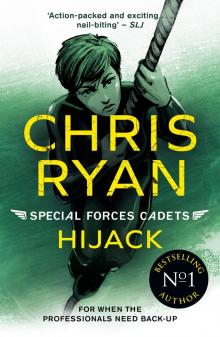 Hijack
Hijack Special Forces Cadets 2
Special Forces Cadets 2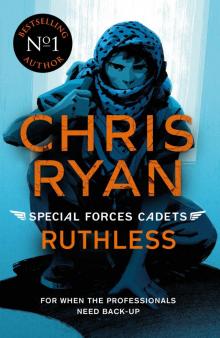 Ruthless
Ruthless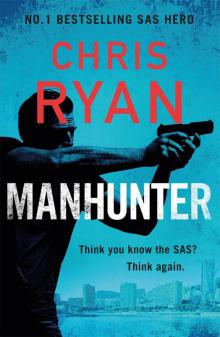 Manhunter
Manhunter Special Forces Cadets 1
Special Forces Cadets 1 Red Strike
Red Strike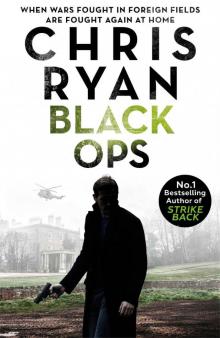 Black Ops
Black Ops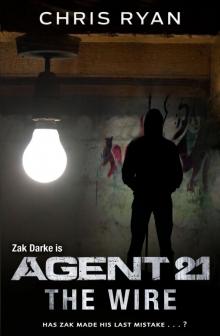 Agent 21: The Wire
Agent 21: The Wire Land of Fire
Land of Fire Alpha Force: Fault Line
Alpha Force: Fault Line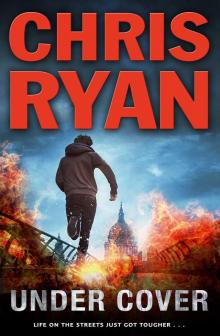 Under Cover (Agent 21)
Under Cover (Agent 21) Endgame (Agent 21)
Endgame (Agent 21) Red Centre
Red Centre Blackout
Blackout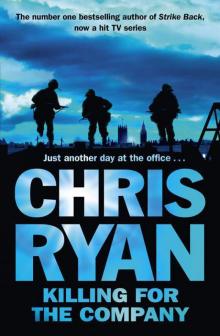 Killing for the Company
Killing for the Company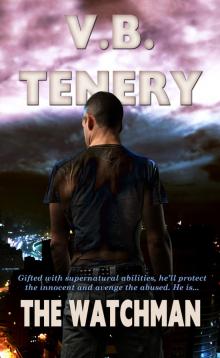 The Watchman
The Watchman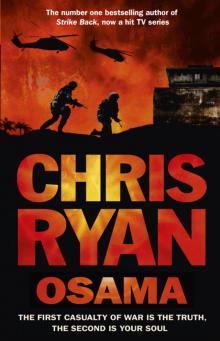 Osama
Osama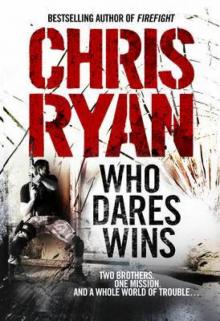 Who Dares Wins
Who Dares Wins The Kremlin Device
The Kremlin Device Hunter Killer
Hunter Killer Alpha Force: Untouchable
Alpha Force: Untouchable Stand By Stand By
Stand By Stand By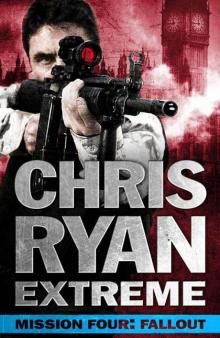 Chris Ryan Extreme: Hard Target: Mission Four: Fallout
Chris Ryan Extreme: Hard Target: Mission Four: Fallout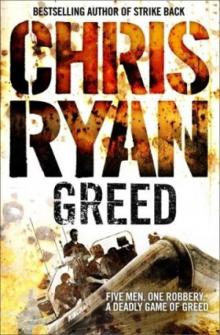 Greed mb-1
Greed mb-1 Alpha Force: Desert Pursuit
Alpha Force: Desert Pursuit Strike Back
Strike Back Greed
Greed The Bay Bulls Standoff
The Bay Bulls Standoff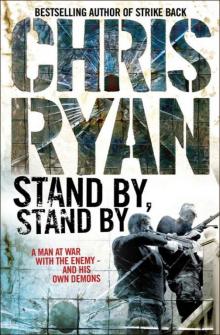 Stand By, Stand By gs-1
Stand By, Stand By gs-1 Outbreak
Outbreak Hunted
Hunted Vortex cr-4
Vortex cr-4 Rat-Catcher
Rat-Catcher Vortex
Vortex Bad Soldier
Bad Soldier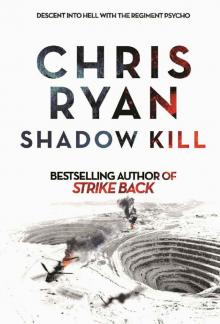 Shadow Kill: A Strikeback Novel
Shadow Kill: A Strikeback Novel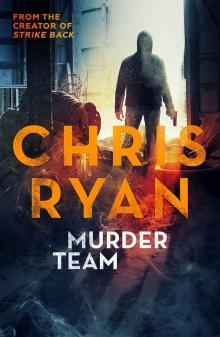 Murder Team (Kindle Single)
Murder Team (Kindle Single) One Good Turn
One Good Turn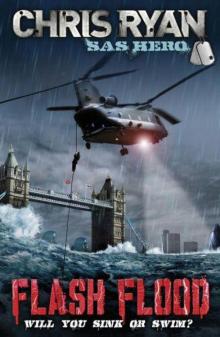 Flash Flood cr-1
Flash Flood cr-1 Night Strike
Night Strike Wildfire
Wildfire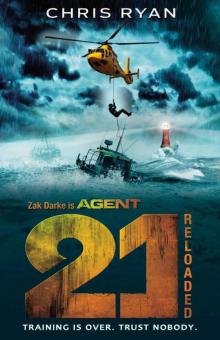 Agent 21: Reloaded: Book 2
Agent 21: Reloaded: Book 2 Chris Ryan Extreme: Hard Target: Mission Two: The Rock
Chris Ryan Extreme: Hard Target: Mission Two: The Rock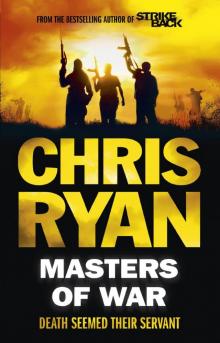 Masters of War
Masters of War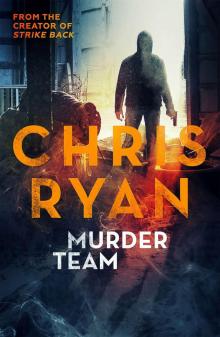 Murder Team
Murder Team War Dog
War Dog Wildfire cr-2
Wildfire cr-2 Survival
Survival The One That Got Away - Junior edition
The One That Got Away - Junior edition The Hit List
The Hit List The Kill Zone
The Kill Zone Medal of Honor
Medal of Honor Battleground
Battleground Twister
Twister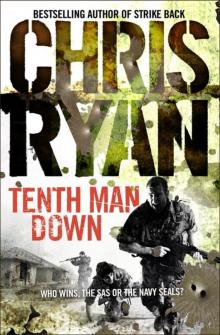 Tenth Man Down gs-4
Tenth Man Down gs-4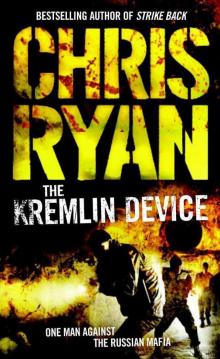 The Kremlin Device gs-3
The Kremlin Device gs-3 Hostage
Hostage Bad Soldier: Danny Black Thriller 4
Bad Soldier: Danny Black Thriller 4 Alpha Force: Blood Money
Alpha Force: Blood Money Firefight
Firefight Chris Ryan Extreme: Hard Target: Mission One: Redeemer
Chris Ryan Extreme: Hard Target: Mission One: Redeemer Hit List
Hit List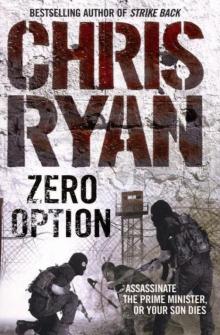 Zero Option gs-2
Zero Option gs-2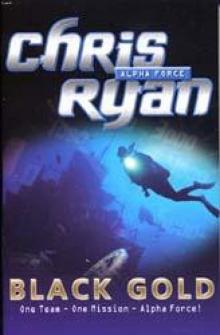 Black Gold
Black Gold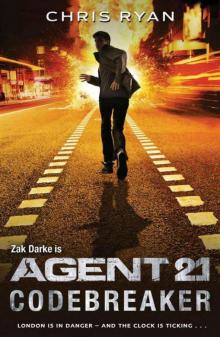 Agent 21: Codebreaker: Book 3
Agent 21: Codebreaker: Book 3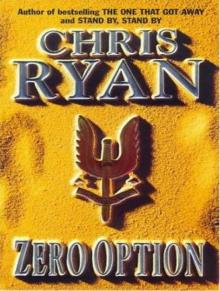 Zero Option
Zero Option Ultimate Weapon
Ultimate Weapon Tenth Man Down
Tenth Man Down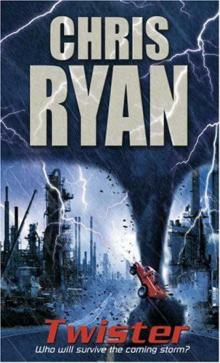 Twister cr-5
Twister cr-5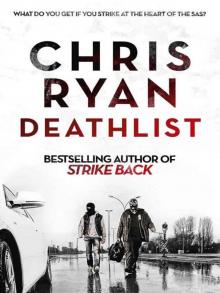 Deathlist
Deathlist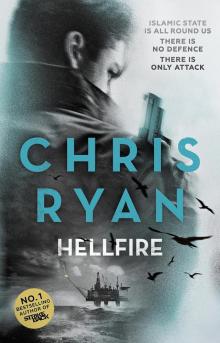 Hellfire
Hellfire Flash Flood
Flash Flood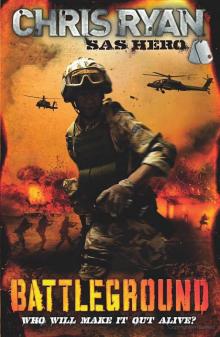 Battleground cr-6
Battleground cr-6 The Increment
The Increment